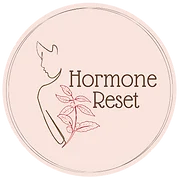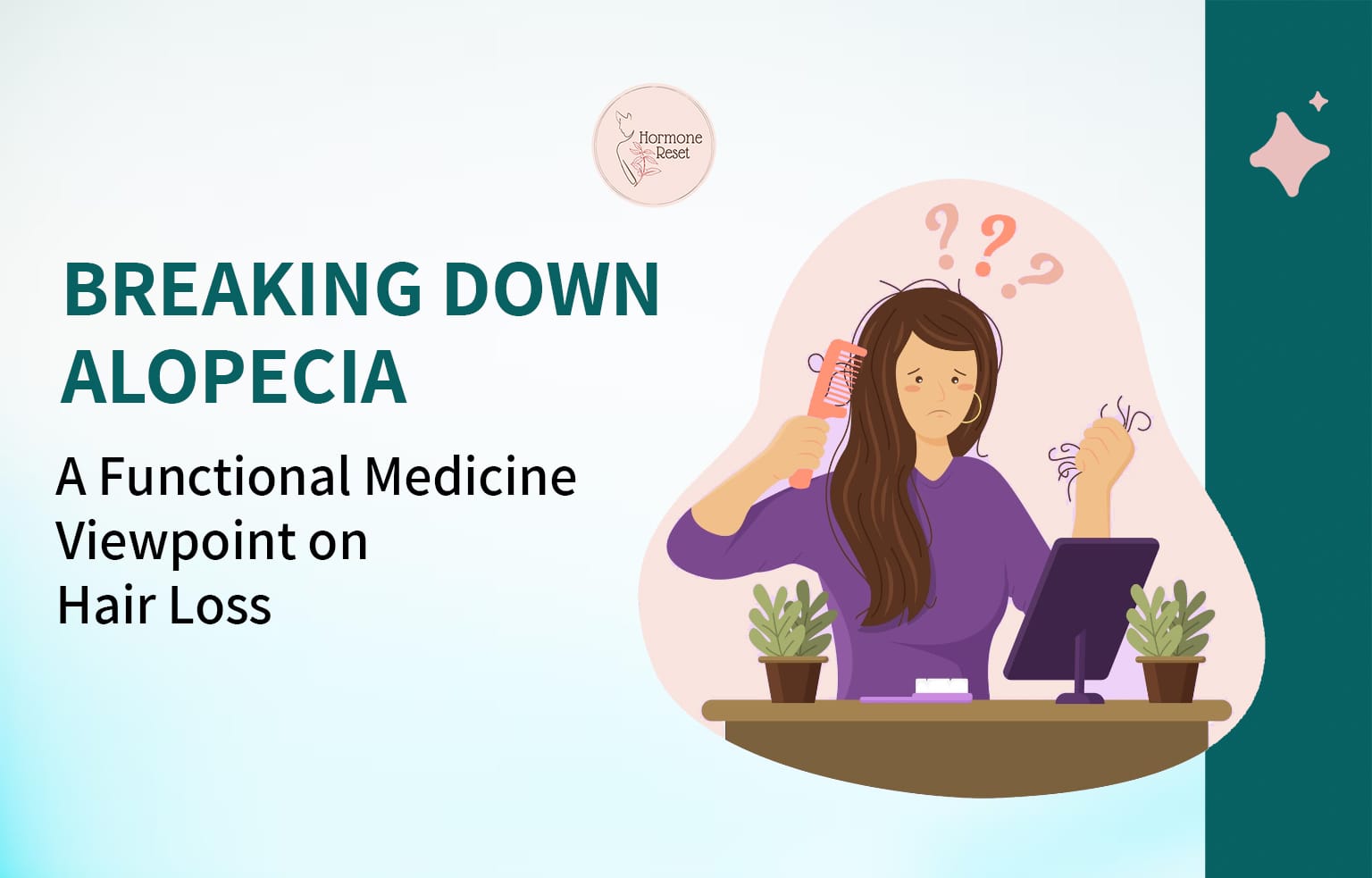Noticing hair thinning in patches, excessive stray hairs, or a general increase in hair loss can be distressing, especially when simple home remedies or conventional dermatologist visits offer no lasting relief. This often signals a deeper issue, prompting a shift in focus towards understanding and addressing the underlying cause of uncontrollable hair loss through a functional medicine approach.
Understanding Alopecia
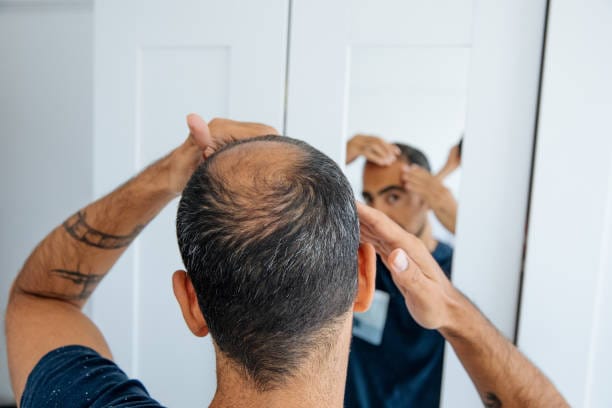
Alopecia is a medical condition characterized by hair loss on the scalp, face, or other parts of the body. It can stem from various factors, including genetics, stress, autoimmune conditions, hormonal imbalances, and dietary deficiencies.
The Crucial Role of Keratinocyte Cells :
At the heart of healthy hair growth are keratinocyte cells, which are the primary cells found in the outermost layer of the skin (the epidermis). These cells are directly responsible for producing keratin, the structural protein that constitutes hair, nails, and skin. While alopecia is not a direct disease of keratinocytes, their health
The Crucial Role of Keratinocyte Cells
At the heart of healthy hair growth are keratinocyte cells, which are the primary cells found in the outermost layer of the skin (the epidermis). These cells are directly responsible for producing keratin, the structural protein that constitutes hair, nails, and skin. While alopecia is not a direct disease of keratinocytes, their health and function significantly impact hair loss. When these cells are damaged or under-functioning due to factors such as nutrient deficiency, oxidative stress, or inflammation, hair growth can become weak, brittle, or even stop. Understanding this vital link is key to tailoring a treatment plan that protects and nourishes these cells at their fundamental level.
and function significantly impact hair loss. When these cells are damaged or under-functioning due to factors such as nutrient deficiency, oxidative stress, or inflammation, hair growth can become weak, brittle, or even stop. Understanding this vital link is key to tailoring a treatment plan that protects and nourishes these cells at their fundamental level.
Types of Alopecia
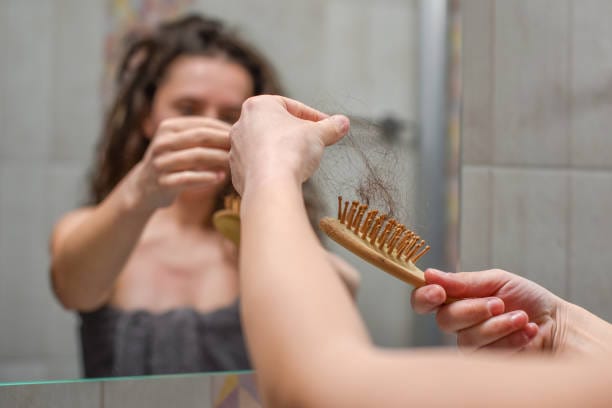
Alopecia is classified into different types based on its symptoms and causes:
- Androgenetic Alopecia: It is the most common type of hair loss. In men, it typically presents as a receding hairline and thinning at the crown, while in women it usually appears as diffuse thinning over the crown and widening of the part line without significant hairline recession
- Alopecia Areata (AA): An autoimmune disorder where the body’s immune system mistakenly attacks its own hair follicles, leading to hair loss in patches on the scalp or other body parts. This unpredictable condition affects millions globally. AA can begin at any
age, with 40% experiencing symptoms by age 20.Importantly, it usually does not cause scarring, meaning hair loss is transient and hair can often grow back. In severe cases, it can progress to total scalp hair loss (alopecia totalis) or total body hair loss (alopecia universalis).
- Telogen Effluvium: This type of hair loss is generally caused by stress, illness, or hormonal changes, leading to diffuse hair loss across the scalp.
- Traction Alopecia: Resulting from repeated pulling or tension on the hair, often due to hairstyles such as tight braids, weaves, or ponytails.
- Cicatricial Alopecia: A rare form of hair loss caused by inflammation that damages hair follicles, leading to scarring and permanent hair loss.
Uncovering Root Causes Through Functional Medicine Lab Testing
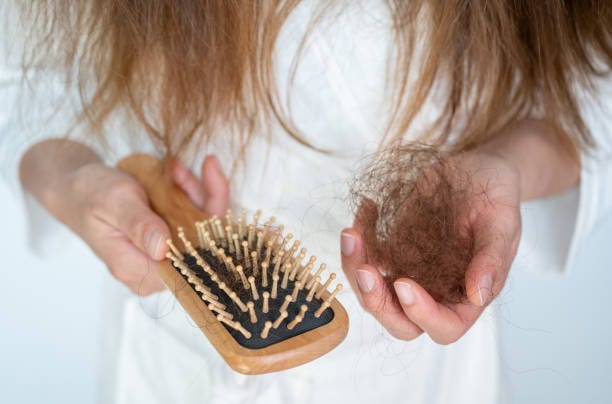
A functional medicine approach to alopecia is holistic, focusing on identifying and addressing the underlying causes of hair loss to support the immune system and promote hair health. Before tailoring a plan, comprehensive testing helps pinpoint specific imbalances:
- Comprehensive Gut Testing: A GI-MAP test measures the abundance of different gut microbes, along with markers of dysbiosis, inflammation, and intestinal permeability (using zonulin). This is crucial as gut microbiome imbalances can influence systemic inflammation and autoimmune responses, impacting the gut-skin axis.
- The ANA (Antinuclear Antibody) test helps detect autoimmune activity in the body. In cases of alopecia, especially alopecia areata, a positive ANA may suggest an underlying autoimmune condition (like lupus, thyroid disease, or connective tissue disorders) contributing to hair loss.
- Thyroid Testing: A Complete Thyroid Panel (measuring TSH, free and total T3, free and total T4, and reverse T3) is assessed to check for conditions like Hashimoto’s thyroiditis, which commonly causes hair loss and is often linked to other autoimmune conditions.
- Iron Levels: An iron panel provides a comprehensive analysis of iron status, as iron-deficiency anaemia and low serum ferritin are commonly associated with hair loss and AA.
- Micronutrients: A micronutrient panel (such as the Spectracell test) measures levels of vitamins, minerals, and other essential nutrients. This helps identify deficiencies in crucial elements like niacin, biotin, zinc, and vitamins A and D, which are known to impact hair growth and are associated with AA.
- Other Lab Tests:
- In cases where diagnosis remains uncertain, a swab for fungal infections (e.g., tinea capitis) may be considered.
- If the diagnosis is still unclear after other tests, a skin biopsy may be taken from the affected areas for microscopic examination.
Functional Medicine Approaches to Correct Alopecia
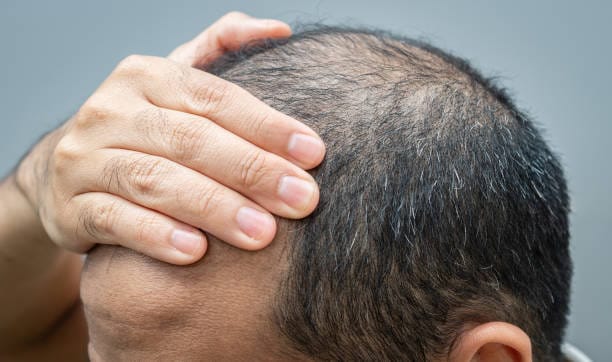
A personalised functional medicine plan aims to create an ideal environment for keratinocytes to thrive, thereby encouraging new, stronger hair growth and supporting overall hair health.
Nutritional Support to Boost Keratinocyte Activity
Targeted nutritional support is vital for optimal keratinocyte function and hair growth:
- Biotin (Vitamin B7): An essential nutrient for keratin production; deficiency can lead to brittle hair and alopecia.
A personalised functional medicine plan aims to create an ideal environment for keratinocytes to thrive, thereby encouraging new, stronger hair growth and supporting overall hair health.
Nutritional Support to Boost Keratinocyte Activity
- Zinc: Known to support keratinocyte proliferation and repair, zinc is a key supplement, especially as deficiency is strongly linked with alopecia areata. A 2020 review in Dermato-Endocrinology highlighted that keratinocyte growth and hair follicle cycling are strongly influenced by zinc availability.
- Vitamin D: This vitamin regulates keratinocyte differentiation, and low levels are common in chronic hair loss patients. Its receptors significantly influence keratinocyte growth.
- Vitamin A & E: These are powerful antioxidants that protect keratinocytes from oxidative stress. Vitamin A also helps activate hair follicle stem cells.
- Amino Acids (Cysteine, Methionine): These are the fundamental building blocks of keratin protein itself.
- Iron, Niacin, Omega-3 Fatty Acids, and Selenium: Supplemented as needed to address specific deficiencies and support immune function and thyroid health.
Plant Compounds that Support Keratinocyte Renewal
Certain plant compounds offer potent support for hair health:
- Curcumin (from Turmeric): With its anti-inflammatory properties, curcumin can enhance keratinocyte migration and wound healing.
- Green Tea Polyphenols (EGCG): These promote keratinocyte survival and protect against UV damage.
- Aloe Vera Extract: Used to stimulate keratinocyte migration and help repair scalp tissue.
- Korean Red Ginseng: Studies show its anti-allergic and anti-inflammatory effects can promote hair follicle recovery and improve hair density and thickness in AA patients.
- Peony and Glycyrrhizin (from Licorice): A combination of these, used in traditional Chinese medicine, has been shown to improve AA severity in children due to their anti-inflammatory and immunosuppressive impacts.
Dietary and Gut Health Approaches
Nutrition plays a crucial role in managing autoimmunity and inflammatory conditions like AA:
- Anti-inflammatory Diet: A personalised anti-inflammatory diet, similar to the Mediterranean Diet, rich in raw vegetables, high-quality protein, and fresh herbs, is recommended. This involves avoiding foods that trigger inflammation (like sugar, refined carbohydrates, processed foods) and focusing on nutrient-dense options. This dietary shift is critical in reducing cytokine stress that can damage keratinocytes. For patients with AA and celiac disease, a gluten-free diet may be beneficial.
- Gut Health Focus: Rebalancing the microbiome and supporting gut health is key to managing inflammation and autoimmunity. This involves incorporating probiotic-rich foods (like kimchi and sauerkraut) and prebiotic-rich foods (like artichokes, garlic, and beans) to nourish healthy bacteria and support the mucosal barrier.
- High-Quality Protein: Adequate protein intake from sources like free-range meats, non-GMO plant proteins, and wild-caught fish is emphasised as crucial for hair growth.
Hormone Balance
If any hormonal imbalances are identified through testing, a plan might include lifestyle and dietary adjustments, or hormone replacement therapy if recommended, to rebalance hormones.
Stress
Recognising that stress can contribute to hair loss, functional medicine practitioners often recommend stress management techniques like meditation, yoga, or deep breathing exercises. These can help manage anxiety and improve overall quality of life, which is especially important as stress can impact the immune system.
Rose Absolute Oil’s calming and relaxing scent can also help reduce stress and anxiety. Hypnosis and self-hypnosis may also be used to reduce anxiety and depression often experienced by AA patients.
Herbs & Oils for Keratinocyte Activation
Topical and internal herbs and oils can support hair follicle health:
- Rosemary Oil: Applied topically, this oil boosts scalp blood circulation, which helps in nourishing keratinocytes, and also offers antioxidant and anti-inflammatory benefits.
- Bhringraj (Eclipta alba): An Ayurvedic herb shown to activate hair follicle keratinocytes.
- Gotu Kola (Centella asiatica): Included for its ability to stimulate keratinocyte proliferation and collagen synthesis.
- Rose Absolute Oil: Beyond its anti-inflammatory, antioxidant, moisturising, and relaxing properties, Rose Absolute Oil is specifically noted to encourage the growth of new keratinocyte cells.
- Batana oil: rich in vitamin E and fatty acids, helps moisturize the scalp and reduce hair breakage. While it can improve shine and strength, no clinical studies confirm its role in reversing alopecia. Its effects are mainly cosmetic, making it more of a supportive oil than a true regrowth treatment.
- Coffee or caffeine serums, on the other hand, show more scientific promise. Research suggests that caffeine can penetrate hair follicles and stimulate keratinocyte activity. Small studies indicate that it may prolong the growth phase (anagen) and counter DHT, a key factor in androgenetic alopecia.
- Nettle tea or extract has long been used for hair and scalp health. It contains anti-inflammatory compounds and may modestly block 5α-reductase, part of the DHT pathway linked to hair loss. Traditionally taken as tea or used as a rinse, nettle supports scalp health and may reduce shedding.
- Other nourishing oils like coconut, castor, jojoba, and peppermint oil are also commonly used for their benefits in strengthening hair follicles and reducing inflammation. Essential oil blends including cedarwood, lavender, thyme, and rosemary have shown promising results in studies for reducing hair loss in AA patients when applied with scalp massage.
Complementary and Integrative Therapies
Integrative approaches often incorporate additional modalities to help restore balance and address hair loss:
- Red Light Therapy (Low-Level Laser Therapy): This therapy is known to stimulate keratinocyte proliferation in hair follicles.
- Scalp Massage & Microneedling: These techniques are used to increase blood flow, delivering oxygen and crucial nutrients directly to keratinocytes.
- Cryotherapy: Utilises cold temperatures to potentially alter immune processes and structural components of hair follicles.
- Acupuncture: May help manage hair loss by calming inflammation at the hair bulb, stimulating hair follicles, and activating blood circulation.
Summary
An autoimmune condition called alopecia areata causes hair loss, typically in small, round patches, when the immune system targets hair follicles. Even though it usually begins on the face or scalp, it can occasionally spread to most or even all of the body’s hair.
In order to suppress immune activity and promote hair regrowth, conventional treatment typically involves steroid injections or oral/topical medications.
An integrative and functional medicine approach, on the other hand, takes a more thorough approach, investigating triggers like chronic inflammation, nutritional deficiencies, and imbalances in the gut microbiome. This method aims to strengthen the immune system, restore internal balance, and enhance general well-being in addition to hair health by emphasising diet, targeted supplementation, and supportive natural therapies.
References
- Kil, M. S., Kim, C. W., & Kim, S. S. (2013). Analysis of serum zinc and copper concentrations in hair loss. Annals of Dermatology, 25(4), 405–409. https://doi.org/10.5021/ad.2013.25.4.405
- Belkaid, Y., & Hand, T. W. (2014). Role of the microbiota in immunity and inflammation. Cell, 157(1), 121–141. https://doi.org/10.1016/j.cell.2014.03.011
- Kwon, O. S., Han, J. H., Yoo, H. G., Chung, J. H., Cho, K. H., Eun, H. C., & Kim, K. H. (2007). Human hair growth enhancement in vitro by green tea epigallocatechin-3-gallate (EGCG). Phytomedicine, 14(7–8), 551–555. https://doi.org/10.1016/j.phymed.2006.09.009
- Stress and the Hair Follicle : https://bit.ly/3HUxDT2
- An Open-Label Randomized Multicenter Study Assessing the Noninferiority of a Caffeine-Based Topical Liquid 0.2% versus Minoxidil 5% Solution in Male Androgenetic Alopecia — PMC full-text: https://pmc.ncbi.nlm.nih.gov/articles/PMC5804833/ PMC
- Role of Caffeine in the Management of Androgenetic Alopecia — (in vitro study) via International Journal of Trichology: https://www.researchgate.net/publication/233770873_Role_of_Caffeine_in_the_Management_of_Androgenetic_Alopecia
- Computational drug discovery of potential 5α-reductase phytochemical inhibitors and hair growth promotion using in silico techniques —
https://pmc.ncbi.nlm.nih.gov/articles/PMC12089051/
Stay updated with the latest information on functional medicine
Please subscribe to our social channels for updates related to functional medicines.
Instagram: thehormonereset
Facebook: Hormone Reset
YouTube: Hormone Reset Program
LinkedIn: Hormone Reset
FAQ’s
- Can alopecia be reversed naturally?
- Yes, with lifestyle changes, balanced diet, stress management, and functional medicine support, some forms of alopecia can improve.
- Which vitamin deficiency causes alopecia?
- Deficiency of vitamin D, iron, zinc, and biotin are common causes of hair loss.
- Does stress trigger alopecia areata?
- Yes, high stress can weaken immunity and trigger alopecia areata patches.
- What is the best diet for alopecia?
- A diet rich in protein, omega-3s, antioxidants, and minerals supports hair regrowth.
- Is alopecia a permanent condition?
- Some types, like alopecia areata, may regrow hair, while scarring alopecia can be permanent.
